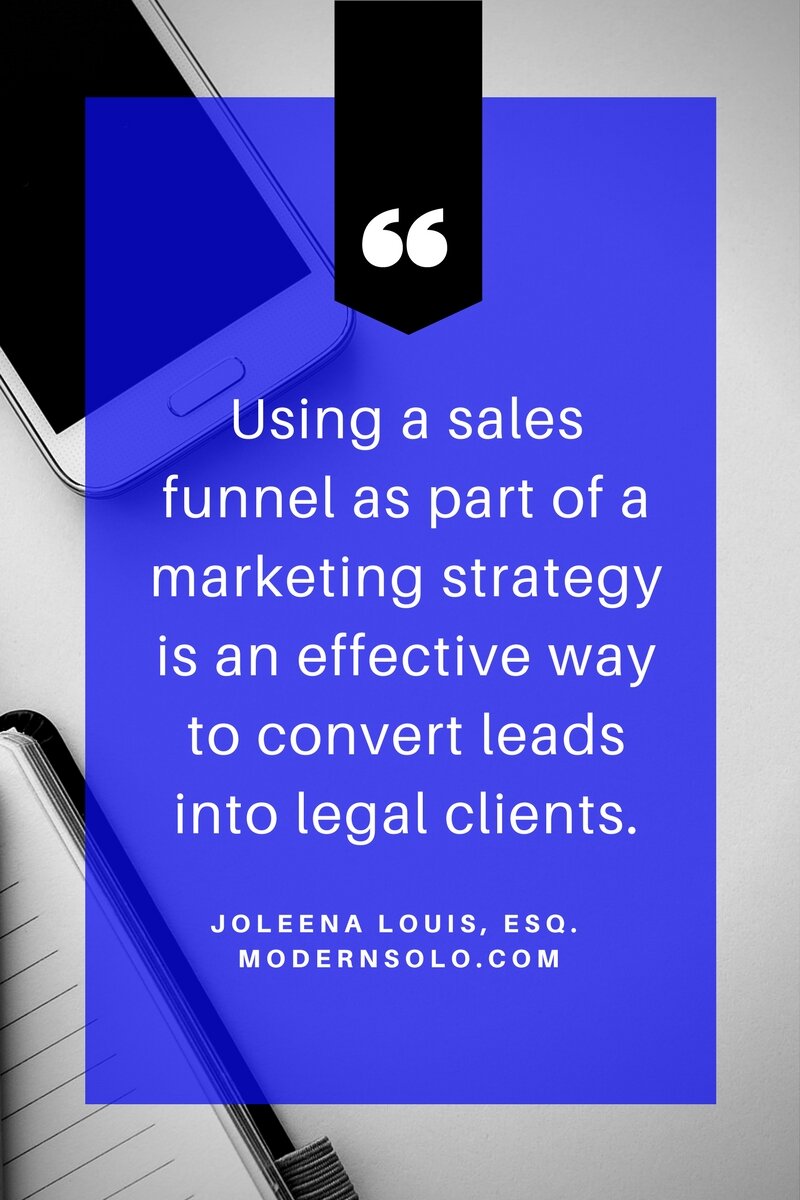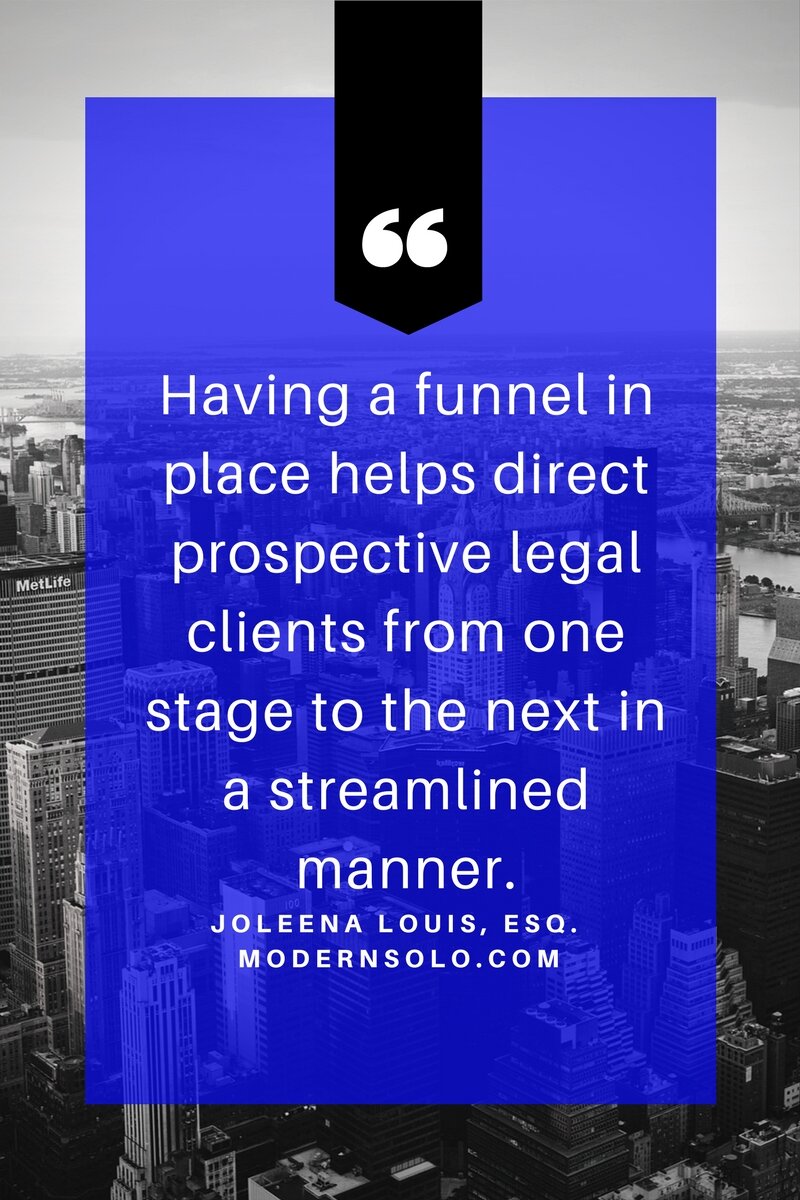How To Convert Leads Into Legal Clients
Using a sales funnel as part of a marketing strategy is an effective way to convert leads into legal clients.
I like to think of sales funnels as a way to organize my marketing strategy. Prospects need different things at each stage of the buying process and having a funnel in place helps direct prospective legal clients from one stage to the next in a streamlined manner.

There are many different ways to organize your funnel, but I like to think of mind in three stages:
- Awareness
- Consideration
- Decision
Awareness Stage
In this stage, the prospect has become aware of their legal problem and will start cursory research into how to solve it. They will most likely google the issue or ask friends and family for referrals.
How To Convert Leads In The Awareness Stage
Content
Content is a key tool to create awareness of your law firm and convert leads into legal clients. One of the first ways a potential client may reach you is when searching for information about a specific subject.
Content in the awareness stage of the sales funnel can include:
- Blog posts
- Video
- Infographics
- Podcasts
- Webinars
- And more.
The takeaway here is to educate. At this stage they want information about their problem, and if you are the go-to source for free quality information, you build trust and brand awareness.
Advertising
Your ads may also be the way someone is introduced to your law practice. You want to provide value. Don’t just link to your website, give them something useful. I usually link PPC ads to a free webinar, checklist, blog post, or other lead magnet.
The key here is repetition. A potential client may have to see your ad multiple times before they call or click.
Social Media
Social media is a huge part of my awareness strategy. I regularly get referrals from Instagram from people who follow my account and tell friends and family about me. They feel like they know me, so when asked about a divorce attorney they refer me.
Social media is also a great way to spread the word. Post interesting content and it will be shared- resulting in an ever growing pool of prospects.
The keys to reaching prospective clients with social media are:
- Consistency- Staying top of mind.
- Providing information/ entertainment/ motivation.
- Showing that you are a real person.
- Using the platform your target audience uses.

Networking/Referrals
Where you network and who you network with are reflections of your brand. You have to have a strategy and you have to know who your ideal client is to network effectively.
If you want to reach prospective clients you have to network with people who can connect you with your ideal client. And you have to teach your referral sources who your ideal client is and how you can help them.
Though I take all types of divorces, my ideal clients are entrepreneurs who want to protect their business from divorce. Knowing this makes it easier to narrow down the type of people to network with (people who work with entrepreneurs), and allows me to clearly articulate the type of client I can help.
Consideration Stage
During this stage, the prospect is interested in your services but needs to learn more before they decide to hire you. The ultimate goal of this stage is to get them to schedule a consultation.
This is the stage where you start talking about you, your brand, and how you can solve their problem better than anyone else.
Value proposition
The primary thing you want to to get across at this stage is that you are an expert and you can solve their problem. Some of the concerns my clients have are protecting their business, protecting their assets, and the ability to continue a meaningful relationship with their children. They also like to keep legal costs under control.
Use content, such as brand videos, to show how your service can solve your client’s problems. Tell stories about what makes your law practice stand apart from the rest.
Online Presence
If a prospect was given your name by someone, they very first thing they will do is google you. What they see will determine if they make the call to set up the consultation.
Go through all the ways a potential client may reach you online and ask yourself:
- Does my logo reflect my brand?
- Is my headshot/image consistent throughout platforms?
- Does my website design reflect my brand? Is it easy to use? Can I easily find out how to schedule a consultation?
- Are my forms clear and easy to use?
- Is my email signature professional?
Lead Magnets
Lead magnets are a great way to demonstrate your expertise while moving a prospect from the awareness to the consideration stage.
A lead magnet is something of value or interest that you offer a prospective client in exchange for their email address.
I’ve used checklists, guides, and webinars, and webinars have been the most successful by far. My client base is more likely to watch a webinar than they are to attend an in-person event, so this has worked well for me.
Giving useful information away for free, (while following ethical guidelines), is a great way to build trust, authority, and credibility.
And now you have their email address that you can use in a targeted email marketing campaign that could result in a consultation.
Reviews/Case Studies
Use these to show proof that clients actually achieved what the prospective client wants to achieve by working with you.
I find it very effective to link to reviews and share case studies as part of my email marketing strategy. I usually add these at the end of an email drip campaign with a link to schedule a consultation. So far, this email converts at about 35%, which I consider successful.
Nurturing process
At this point, many prospective clients may not be ready to make a decision right now. This happens very often in the family law field.
But instead of just giving up on them and letting go, have a system in place to continue to stay top of mind until they are ready.
Continue to show value by sharing useful content and materials that will help them make a decision. This is why building your email list is so important. It gives you the ability to continue to reach people who are on the fence about your services.
Decision Stage
The decision stage is the conversion from lead to legal client. The goal of this stage is to get them to sign your retainer agreement.
If a prospect has made it this far in the funnel, you don’t want to lose them due to a minor mistake. The little things matter.
Sales process
Consistency is imperative to a great customer experience. Have a process in place for intake from the time the prospect calls or enters their information into a form, until the time the sign the retainer.
Some things you may do to make the sales process easier:
- Make it easy to make an appointment with you.
- Send a follow-up email confirming the date, time and location.
- Have them complete a basic intake form in advance and include a list of documents to bring to the consultation.
- Send your basic retainer/ fee agreement terms in advance. Even if you can’t give a fee until you speak to them, at least they will know your payment terms in advance.
A smooth process from the start gives the client a glimpse of what working with you will be like. Exceeding expectations from the start turns prospective clients into ambassadors for your brand.
Physical Space
When a prospect comes into a consultation, what does your office say about your brand? Is it clean? Can they see sensitive information? First impressions matter.
Don’t Forget To Cross-Sell
Every potential client you meet should know every service you offer.
First, they should be made aware of any service that may relate to their problem. For example, my divorce clients often need to update their wills. But most of the time they don’t even think about it until I bring it up.
Next, you should share all other services you offer. The more they know about what you do, the more they can refer.
It’s not always easy to convert leads into legal clients. But a funnel can make the process more organized and effective.

